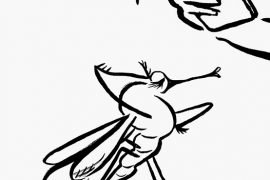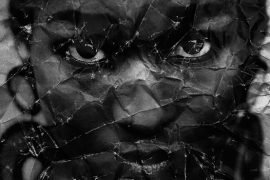[dropcap letter=”A”]
n inspiring article by Daniel Gamper raised, a few weeks ago, the existence of a football pleasure linked to the contemplation of a well-played game. A kind of continued happiness, which would not necessarily culminate in scoring. With absolute justice he pointed to Messi as the supreme architect and paradigm of the total player, for his ability to mobilize the elements and even overcome the whims of fortune. The faith in his game is made explicit with glorious redundancy through the allusion to his holy person as “Messiah” -given the symptomatic, improbably casual homophony- and using the figures in his back as vowels of the word with which the deity is referred (“Dios”/ D10S). Life is ironical: it is common knowledge that the name of the who most has desired to surpass him -with whom the dubiously golden trophy, the ballon d’or, has been distributed for a decade- is almost synonymous, something that emphasizes the antithesis of the characters they represent.
Cristiano Ronaldo is essentially a striker, a player who seems to play for himself, since he is basically happy when he scores, and applauds little (or not at all) his teammates’ goals. His celebrations, on the other hand, are explosive and -according to many- cause for provocation. The truth is that they tend to exhibit a body cultivated conscientiously, which is known to be, with pride, the centre the world’s look. If, from the point of view of philosophical aesthetics, we have read in Gamper’s text that the spectacle that Messi moves offers a lot to think, from the point of view of the cinematographic narrative, so open to mythomania, the figure of a misunderstood gunman fits even more appropriately to the person of Cristiano Ronaldo. In the confrontation of both, there is a paradox, unbearable for the specialist in goals: of the 9 years that they coincided in La Liga tournament, 5 of them the Argentine finished with better records.
FORTUNE’S TWISTS
The topical comparison with Western duels is not only due to the metaphor of shooting. The scorer is a vigilante who is perceived, however, as being outside the law. He wants to fulfil his duty above all else, even if that means provoking the incomprehension of his peers. This point has been recognized in an interview the current season by Luis Suárez, another excessive gladiator, with a rhetorical question: “Which striker is not selfish?”. In fact, the Manichean version of the world, so akin to the Hollywood worldview, does not adequately illustrate the situation. It could be said that there are good ones, bad ones, and vigilantes. For the latter are victims of their memorable and legitimate mission -goal-, monopolizing protagonism and puts themselves in the forefront, very close to the gods. The striker approaches glory, like an Icarus puffed up by his efficiency, opening his wings over the sea of possible errors that will condemn him, even if he does not know it yet.
Installed in the vanity of the predator, the antipathies towards the person of Cristiano Ronaldo continue to be the order of the day, either in the form of envy -for being “handsome and rich”, according to his words- or for a disconnection from the common reality, that at times feels as almost absolute, when showing little companionship or solidarity. Gary Lineker, in his very active Twitter account, recently addressed him a new critical comment. And yet, someone might ask, what responsibility may Cristiano have if a small plane carrying a footballer is lost in the ocean on the very same day when, after appearing before the judge dressed as someone who has to parade on the red carpet -being sentenced to pay about 20 million euros- he decides to take a selfie on his luxurious plane?
Flying can be beautiful, but wings are always borrowed. Identifying oneself with the main cause of reality is a mistake from which nobody is completely protected, much less those who think they know the most.
The lack of perspective regarding one’s centrality in the world, much as empathy towards the others -identification with their state, however different it may seem- does not represent an exclusive defect of some professions. Nobody is oblivious to the possibility of suffering an attack of ego, or of being installed in the absolute sameness of the child for more time than expected. Even the most educated individuals may suffer from both confusions, like the specialists in a certain discipline, as Socrates tried showed, in order to corroborate or disprove the strange assertion of the oracle. The problem, today, is that those who benefit the most from access to information and the business of social networks, as protagonists of an exponentially lucrative “show”, sparkle with hand in hand with a profound ignorance of the fragility that makes possible their sustentation.
Flying can be beautiful, but wings are always borrowed. To identify oneself with the first cause of reality and the necessary order of things, that the Greeks called ananké, represents a confusion of which -as we said- no one is completely free, much less those who think they know the most. Matchpoint, probably the best film that Woody Allen made in recent decades, shows how “good luck” can also lead to a pernicious deification. The exceptionality of the tennis ball that hits the upper tape of the net and inexplicably falls on the other side -favouring the player, even if he does not deserve it- apparently places the individual in a kind of moral state of exception. But far from benefiting him -as it would seem, according to worldly interests- what luck does is to build the bridge towards that deification, and with it to internal corruption. This same idea had already been raised by Boethius, “last of the Romans and first of the scholastics”, in his Consolation of philosophy, unquestionable bestseller during the Middle Ages.
Certainly, thinking of the ancients we can remember the Latin motto that pointed that “fortune favours the bold” (Audentes fortuna iuvat in Virgil’s Aeneid, Book X), and that Daniel Gamper seemed to allude to referring to the confidence that comes from the actions of Messi: “an immutable faith according to which, once he decides to go for it, he knows destiny will favour him”. But in the case of the Portuguese that sentence is obscured by the Cainite suspicion -uncomfortable whisper- of knowing he actually is the “second most favoured”. An unbearable truth, which he tries to liquidate by various means. Thus, the guttural yell -after jumping and turning, never losing sight of the location of the camera- seeks to accredit the pragmatically primitive dimension of self-affirmation as a triumph, even in its digital replication. Verification of the fulfilment of duty, that eventually ends with the self-evident gesture, like insisting it’s me, the one who is here. And yet, the excessive willingness to be very comfortable with himself validates the profound meaning of Boethius’ intuition: fortune tends to hide the sense of true happiness.
HISTRIONISM AS A TANGENT
Those gestures are redundant and theatrical, inevitably histrionic. And, yet, highly symptomatic, because they reveal how hard it is to be subjected to the tyranny of numbers. Both in terms of the number of goals scored and the fact of loading the ballast of being “the second one”. Nothing to see, no pity to feel -one might think- bearing in mind the situation of most workers. It may be difficult to feel empathy for such a specimen- if we think precisely of the numbers they handle, of their economic possibilities – but there is a truth that tortures every human being, and especially that which is at the epicentre of accountability, if he thinks just a little about it. And it is that the task of the scorer, maximum aspiration of the efficient or skillful worker cannot compete with the disinterested and great beauty of the artist’s work. “È così triste essere bravi: si rischia di diventare abili”, says Jep Gambardella to his Milanese partner after making love.
The mythical narrative often brought up is that of a Narcissus in love with himself: an individual turned into a character, who drowns because of his pristine and fatally attractive representation.
On the other hand, losing oneself in the recount of what one possesses only confirms the irreparableness of the true loss, which the Albert Camus’ Caligula experiences exemplary after the death of his beloved. Faced with the dissatisfaction of not being able to achieve the impossible, he decides to apply the productive logic -that which seems to interest most men- to the last (bloodthirsty) consequences: “Si le Trésor a de l’importance, alors la vie n’en a pas“. The question is what to do with that sleepless truth, how to continue with the day to day when one is the most powerful among mortals without being completely a god, as happens to Hölderlin’s Hyperion.
The other mythical narrative that is often brought up when talking about Cristiano, the most obvious one according to the form of complacency that prevents taking perspective, is that of a Narcissus in love with himself; individual turned into a character in front of the wonderful reflection of his performance, which is drowned because of that pristine and fatally attractive representation. Caligula, paradigmatic anti-hero, does not drown, but he experiences the culmination of a life full of excesses -the final ecstasy, his death, as Camus specifies- with the symbolic cracking of the mirror. The dilemma that is proposed in the case of the striker of course is not so dramatic, and nevertheless it opposes without nuances victory and defeat. Idea condensed in Garibaldi’s motto “Roma o Morte” and that -back to the infantilism of that being closer to the gods- can be translated as: “Caesar or nothing”.
The football passion of Camus, author of that fabulous and disturbing theatrical recreation, has transcended by a phrase, which in a certain way synthesizes it: “Ce que je sais de la morale, c’est au football que je le dois“. As a defender of social rights, he always believed in collective game, in the equitable distribution of tasks, responsibilities and benefits within the same team. In this sense, Joaquín DHoldan remembers in his book Genios del Fútbol that Camus wanted to be a midfielder. Unable to play for having broken his shoes -explains the author- he had to become a goalkeeper. Certainly, a bit far from that democratizing task, but antithesis of the figure of the scorer: the last defender, faced face to face with that fast and determined individual, unshakeable in his personal search for glory, which looks gladly in the mirror of the feat that can make him immortal.
We will not discover now the affective sublimation that sport anthropologically means -condensed in the conception of man as homo ludens– nor will we extend in the well-known comparison with war, already present in the agonistic spirit of the Greeks, who stood out for their taste of competition and the cultivation of excellence even on the battlefield. “Hero” is the one who is admired for his courage and integrity, who becomes an example despite his inevitable misfortune and can be mourned and celebrated for it, giving rise to the psychically restorative phenomenon that Aristotle defined as “catharsis”. However, the result that exalts the goalscorer in our society of spectacle will also be his sentence, when he transmutes him into an anti-hero without his professionalism can barely do anything to avoid the condemnation that means not being able to be or cried.
The adored idol happens to be neglected when his thaumaturgical function disappears
Manuel Vázquez Montalbán wrote, in one of the articles compiled in Football. A religion in search of a God, “the centre forward is a madman of his own (…). He knows about the hopelessness of evenings and afternoons in which all the holes are boarded up and the audience shouts: “Good-for-nothing!”. They ignore that the holes are mysterious, that they suddenly appear in the eyes of the craziest centre forwards, as the ancient angels appeared to the well-disposed virgins”. In the Santiago Bernabéu stadium, the same scenario that hosted a parody of Being John Malkovich -more surreal than Spike Jonze’s film, and that’s saying a lot!- when the audience wore thousands of Cristiano Ronaldo’s masks to promote is candidature for the golden ball in 2013, the “artist” would be whistled repeatedly (2015, 2016, 2017 and 2018) due to its poor performance. The adored idol becomes cursed when the thaumaturgical function disappears.
GOOD THEATER (THE SURREALIST TRUTH)
The experience of “being Christiano” for a day, for a few hours or minutes -as it is narrated in that film- could be pleasant for many of the people behind the false appearance of that celebrity. The reality inherent to the transformation the mask enables has been made explicit by authors such as Slavoj Zizek or Julia Kristeva from Lacanian psychoanalysis, as well as – closer to our context- by the Barcelona philosopher Eugenio Trías, by forcing the Latin etymology of the term “person” (per / sonare) in his early work Philosophy and Carnival: mask that gives volume to the discourse of the actors and that institutes the individual being. To coincide with oneself being another (making one believe that one is actually another) is something that anyone, from childhood, may enjoys, however little one tries it. But what happens when the mask that one puts on coincides with that of oneself? It is possible that, as it happens to John Malkovich when he enters his own mind, in a fascinating metafiction exercise, the absolute self-referentiality provokes a kind of metaphysical indigestion. “I have seen a world that no man should see!” Exclaims with overwhelming realism actor John Malkovich after leaving himself.
It could happen, in the wake of that surrealiste speculation (literally: “over-realistic”) that the fact being projected in everyone as a mere character reveals that one is essentially nothing more than that, a puppet, without an entity of its own. A famous expression, that the character has devoured the person, would be applicable in cases of theatrical overexposure, that of our protagonist or that of certain trainers -José Mourinho at the head- confessed lovers of the performing arts and victims, themselves, of the love to the representation of their role. That outrageous histrionics could be understood as a sort of circular condemnation, in the style of a Sisyphus or a Tantalus. In short, like the hidden side of his apparent wealth, of his “fortune”, as Boethius explained to offer comfort to those in material disadvantage. But, of course -let’s assume it -we can also contemplate the possibility that the actor, who is enriched thanks to our passion for the show, may live happily, oblivious to the threat of temporary or eternal menaces.


















